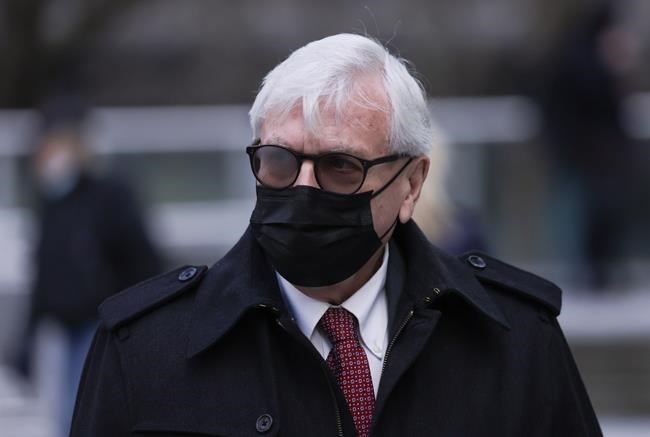VANCOUVER — A former Speaker of the B.C. legislature says he doesn't recall being worried about a conflict of interest after he took guidance from the same lawyer who gave a former clerk advice about a retirement payment that's at the centre of a breach-of-trust trial.
In the Supreme Court of British Columbia on Monday, Crown prosecutor Brock Martland pointed out that when he sought legal advice about the $258,000 financial payout, Bill Barisoff consulted the same lawyer who was used by former legislature clerk Craig James.
James has pleaded not guilty to two counts of fraud over $5,000 and three counts of breach of trust by a public officer in relation to allegations that he used his position for personal gain.
He was escorted from the legislature in 2018 amid a police investigation into allegations involving the retirement benefit, travel expense claims and the purchase of a wood splitter and trailer with public funds.
Martland said James's lawyer advised that his client and three other senior employees of the legislature could get the retirement payout, and that James then recommended that Barisoff also seek advice from the same lawyer.
"Were you concerned about a conflict of interest?" Martland asked Barisoff.
"Not that I can remember," Barisoff replied.
Barisoff said his biggest concern was that one of the four people who James got legal advice for about the retirement benefits was dying of cancer. He did not recall seeking or taking legal advice from anyone else but he may have consulted the management committee of the legislative assembly, he added.
But Martland wondered how the committee could have given him advice because it wasn't sitting at that time.
"How would that have happened?" Martland asked.
Barisoff said he talked to members of the committee individually, adding he did not have any recollection of speaking with anyone in particular and he had nothing in writing.
"Did you ever reach out to the conflict of interest commissioner about this?" Martland asked.
"I don't recall ever doing that," said Barisoff, who was Speaker from 2005 to 2013.
Barisoff said he also doesn't remember having any discussions with the comptroller, whose responsibilities include the government's financial management systems.
"Did you trust and rely on the integrity of the people working at the legislature as you dealt with this issue?" Martland asked.
"Yes, most definitely," Barisoff said.
"Why?" Martland asked.
"Because if you didn't have the trust of the people that you work with it would be pretty difficult to run the operation," Barisoff replied.
Barisoff told Associate Chief Justice Heather Holmes that he had no relationship with James outside of the legislature and never went to the home of the former clerk, who he described as the CEO of building operations and the grounds.
But he said James had visited his home in the south Okanagan about five times as well as at least twice after his retirement in June 2013, including when James delivered some items fromBarisoff's office.
Kate Ryan-Lloyd, the current clerk of the legislature, earlier told the trial she also received a retirement allowance, of $118,000, but felt "uncomfortable" about the money and returned it in 2013.
Ryan-Lloyd has testified that she first learned of the retirement benefit in late 2011 when two members of the clerk's office announced plans to leave their jobs and sought payment.
The court has heard the allowance was created in 1984 for officers who did not qualify for public pension plans or executive benefit packages, but that the payment structure for those officers changed in 1987.
Ryan-Lloyd said James was initially "skeptical" of the two staff members' claims to the benefit and told her that he had retained a lawyer to consult on the issue.
On Feb. 10, 2012, she said, James told her that based on legal advice, Barisoff had determined the retirement benefit was still effective and both she and James qualified.
Barisoff advised the program should be terminated and all outstanding claims should be paid out to eliminate ongoing liability to the legislative assembly, Ryan-Lloyd told the court.
Under questioning by defence lawyer Gavin Cameron on Monday, Barisoff said he received legal advice that all four people were entitled to a payout and that the legal way of doing things was to shut down the payment program.
Barisoff testified that he was "very concerned about the unfunded liability that the legislative assembly or the taxpayers of B.C. would have to be involved in."
This report by The Canadian Press was first published Feb. 14, 2022.
Camille Bains, The Canadian Press



